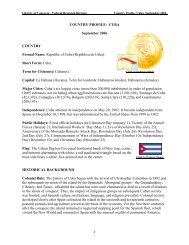1 - American Memory
1 - American Memory
1 - American Memory
You also want an ePaper? Increase the reach of your titles
YUMPU automatically turns print PDFs into web optimized ePapers that Google loves.
206<br />
Consumers had to pay higher prices for food during June, July,<br />
and August of 1971 than the same months during 1970. However, part<br />
of the increase in tlie Consumer Price Index for food may be traced<br />
to inflationary factors and to severe droughts on the mainland and<br />
in Maui. The national wage-price freeze, which was in effect during<br />
the strike, also helped keep prices down. Only in the case of raw agri-<br />
cultural produce were merchants allowed to raise prices.<br />
Hawaii's food and feed requirements, which are virtually dependent<br />
on U.S. mainland suppliers for food and animal feed needs were also<br />
affected. Hawaii produces less than one-half of her meat, poultry, pork,<br />
and fruit and vegetable requirements, and virtually no animal feeds.<br />
Rice, a major staple item in Hawaii, and all canned meats and canned<br />
and frozen fruits and vegetables must be imported into the State.<br />
Under normal circumstances Hawaii's food and feed suppliers main-<br />
tain average inventories of 4 to 6 weeks' supply. In situations where<br />
a transportation disruption is expected, suppners attempt to build up<br />
a ."J months' inventory.<br />
Transportation disruptions or even fear of a disruption causes<br />
hoarding of major food and feed items. This situation creates a serious<br />
imbalance in food and feed distribution with a resulting rapid decline<br />
in available supplies during the early days of a transportation<br />
disruption.<br />
The possibility of strikes occurring also raises the cost of doing busi-<br />
ness in Hawaii. Businesses need to keep large inventories as well as<br />
discount expected profit rates of return on investments to make allow-<br />
ances for snipping interruptions. These result in higher costs which<br />
inevitably are passed on to consumers and contribute to this State's<br />
exceptionally high cost of living.<br />
H.R. 7189, if it does not tread on the principle of free collective<br />
bargaining or violate existing and effective concepts embodied in Fed-<br />
eral laws relating to maritime commerce, can insure the maintenance<br />
of normal supply lines to Hawaii while providing additional time<br />
necessary for the settlement of any future disputes.<br />
We respectfully urge your committee's favorable consideration of<br />
H.R. 7189, bearing in mind the importance of preserving our State's<br />
economic integrity and security as a requirement for the continued<br />
progress and security of our entire Union.<br />
I thank you for the opportunity to make this statement.<br />
Mr. DiNOELL. I think you have done a very excellent job of making<br />
the presentation here.<br />
You have given us a most able and carefully presented statement.<br />
The Chair certainly commends you. I want you to convey to Acting<br />
Governor Ariyoshi our appreciation for your presence. Again the<br />
committee wants you to know the high regard we have for Mr. Mat-<br />
sunaga, who is one of the most outstanding and able Representatives in<br />
the Congress, and Mrs. Mink who in the view of all of us is without<br />
peer in this body.<br />
I want you to know their interest in this bill is the reason that we<br />
are holding the hearing today.<br />
It may he as matters proceed we will have additional questions. We<br />
hope you will remain so that if we do, we can direct them to you.<br />
Mr. Matsunaga.



![Albert Einstein Papers [finding aid]. Library of Congress. [PDF ...](https://img.yumpu.com/21604228/1/190x245/albert-einstein-papers-finding-aid-library-of-congress-pdf-.jpg?quality=85)





![American Colony in Jerusalem Collection [finding aid]. Library of ...](https://img.yumpu.com/17941275/1/190x245/american-colony-in-jerusalem-collection-finding-aid-library-of-.jpg?quality=85)



![Piccard Family Papers [finding aid]. - American Memory - Library of ...](https://img.yumpu.com/17941234/1/190x245/piccard-family-papers-finding-aid-american-memory-library-of-.jpg?quality=85)


